A
Syrian fighter jet hit targets inside Damascus for the first time on
Tuesday, a watchdog said, as air strikes pounded rebel bastions around
the country and an air force general was shot dead.
It dropped four bombs on the east Damascus neighbourhood of Jobar,
near the opposition-held suburb of Zamalka, where rebel fighters were
locked in fierce clashes with the army, the Syrian Observatory for Human
Rights said.There were no reports of casualties in the bombing run, which AFP correspondents said was heard across the capital.
Only helicopter gunships have previously been used to strafe areas inside Damascus, said Observatory director Rami Abdel Rahman.
The strike, and more raids around the country, came as Syrian rebels claimed to have assassinated an air force general in Damascus.
State television said the general, Abdullah Mahmud al-Khalidi, was killed in the northern Damascus district of Rukn al-Din, but gave no further details.
The general was shot dead on Monday evening as he left a friend's home, a security source in Damascus told AFP on condition of anonymity.
The rebel Free Syrian Army (FSA) claimed in an Internet statement it had killed Khalidi, who it said was in charge of training, as well as an air force intelligence specialist.
The government has intensified air strikes against rebel-held areas in recent days, with more than 60 raids on Monday, the most in a single day so far, the Observatory said.
On Tuesday, air strikes hit rebel bastions around Damascus including the town of Douma. The Observatory said at least 23 people were killed there, including 18 in jet strikes and bombardment by tanks, and that the toll was expected to rise.
The northwestern town of Maaret al-Numan, seized by rebels earlier this month, was also hit, with seven civilians killed, including four children, it said.
The army has been battling rebels for weeks for control of the town, which is on a key supply route between Damascus and the northern city of Aleppo.
Tuesday also saw clashes between rebels and troops backed by Palestinian fighters at the Yarmuk refugee camp, home to 148,500 Palestinians on the edge of the capital.
Anwar Raja, spokesman for the pro-Damascus Popular Front for the Liberation of Palestine-General Command, said its forces clashed for about an hour with rebels trying to infiltrate the camp but that there were no casualties.
There are more than 510,000 Palestinian refugees living in Syria, and their leadership is largely supportive of President Bashar al-Assad's regime.
At least 123 people, including 57 civilians, 41 soldiers and 25 rebels were killed in fighting on Tuesday, the Observatory said.
With international envoy Lakhdar Brahimi due in China in a bid to revive peace efforts, Qatari Prime Minister Sheikh Hamad bin Jassem al-Thani, a vocal supporter of arming the rebels, said the international community's failure to halt the fighting was making it complicit in the violence.
"What is happening in Syria is not a civil war but a war of extermination against the Syrian people," he told Al-Jazeera television.
The war was being waged "with a licence to kill, endorsed firstly by the Syrian government and secondly by the international community," he said.
On the first day after the Eid al-Adha Muslim holiday, which saw a ceasefire bid collapse in the face of renewed clashes, car bombings and air strikes, the Observatory said more than 500 people had died in fighting over its four days.
Turkey and Syria, whose relations have strained in recent months, lashed out at each other on Tuesday, with Ankara refusing any dialogue with what it said was a Damascus regime carrying out "massacre" even during Eid.
Damascus hit back and said "Turkey and the Gulf countries are responsible for the continued bloodletting in Syria."
Brahimi was to travel to China from Russia. Both are historic Damascus allies and have repeatedly blocked tough UN Security Council action against Assad's government.
Diplomats say the UN-Arab League envoy is to present the council with new proposals in November following the two visits.
The uprising, which began in March 2011 as a peaceful protest movement, has escalated into an armed insurgency. More than than 35,000 people have died according to the Observatory, and at least 20,000 according to the UN.
Most of the rebels are members of Syria's Sunni Muslim majority, while Assad's government is dominated by his Alawite minority, an offshoot of Shiite Islam.

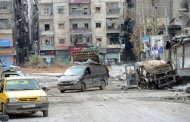
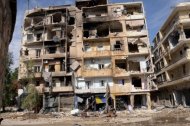
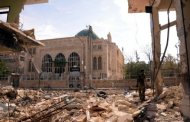
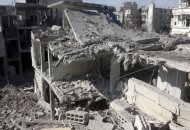
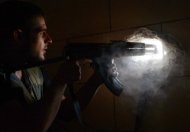




ไม่มีความคิดเห็น:
แสดงความคิดเห็น